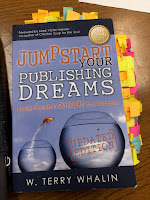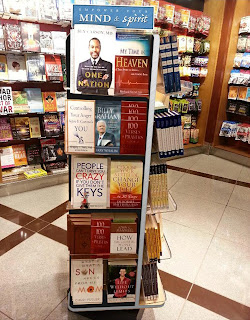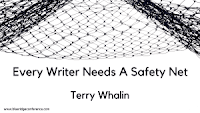By Terry Whalin @terrywhalin
Within the writing world, there
are countless stories to be told in many different formats such as blog posts,
magazine articles and books. As a writer, I enjoy helping other people shape and
write these stories. It gives me a chance to put my own spin on these stories
and get them out into the world. Each of us have an endless supply of such
stories and personal experiences. One of the keys is to get your fingers on the
keyboard and create them in the first place, then do the work to get them out
into the world so other people can read them. Without pitching and making that
right connection to an editor or agent, it remains something in your mind but
not into the world.
Like the picture of the the
spinning top in this article, the toy does not spin without someone taking
action. Action is what we do as writers—day in and day out—especially if we want
our words to get into the world. In this article I want to give you a couple of
examples of how I put my own spin on my writing.
Social Media
Posts
Through the years I've posted
thousands of times on social media. In these articles, I've told about using
tools like Hootsuite and ClickToTweet in this process. These tools help me be
consistent and ClickToTweet gives others an easy way to pass on the article. In
my social media plans, I will highlight articles and other writings from others.
Each time I post, I make sure to include an image (since this image often draws
people to read the words with the post). If the article I am highlighting has an
image, I will use that image or if not, I will quickly find one to use with it.
For my social media posts, behind
the scenes I've created my own “standard” and it's something I encouorage you to
do as well. In addition to a photo with each post, I attempt to include the name
of who wrote the article along with their Twitter handle (not everyone has a
Twitter name but I search for it and try to add it each time). If the person has
a tool to pass on the article, I use that as a starting point, then I add the
name, shorten the link and if not there (add a couple of relevant hashtags). It
does not take a lot of time to meet this standard but it brings consistency to
my various social media posts—and yes I put some effort into these
posts—something I encourage you to do as well.
Most of the time, I hear little
from my social media posts (12–15 times a day) but then someone will comment or
share or indicate some way they have read the post. Sometimes these posts are
new and other times they have been out there for a long time. The interaction
shows me that people read this material—whether they say anything or not. Don't
be surprised if you don't get a lot of response. The key is go keep on going and
be consistent.
Book
Reviews
I've been writing book reviews
for a long time with over 1,100 on Amazon and over 700 on Goodreads (follow this link if you want to see some of them). My reviews
are my own spin or perspective on a particular book. Often I will quote part of
the book (especially on print and not so much on audiobooks) which shows the
reader that I've actually read the book and found a relevant quote to include in
my review. Throughout any week, I receive many more books that I can possibly
read—much less write about—but I continue doing some of them on a regular basis
(even though no one pays me for these reviews). If you read a book or listen to
it, I encourage you to take a few minutes and write a review. It will be a way
to support the author and also good for your writing life.
How are you putting your spin on
your writing? Let me know in the comments below.
Tweetable:
Labels: Amazon, book reviews, books, ClickToTweet, Goodreads, hootsuite, magazine writing, publishing, Pyt Your Spin on Your Writing, social media, Terry Whalin, The Writing Life, writing



































